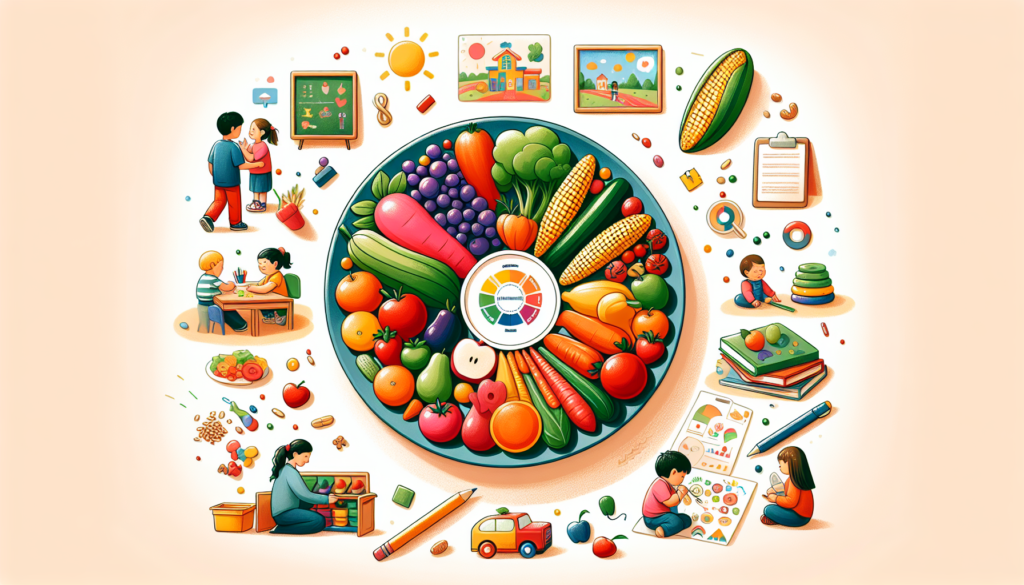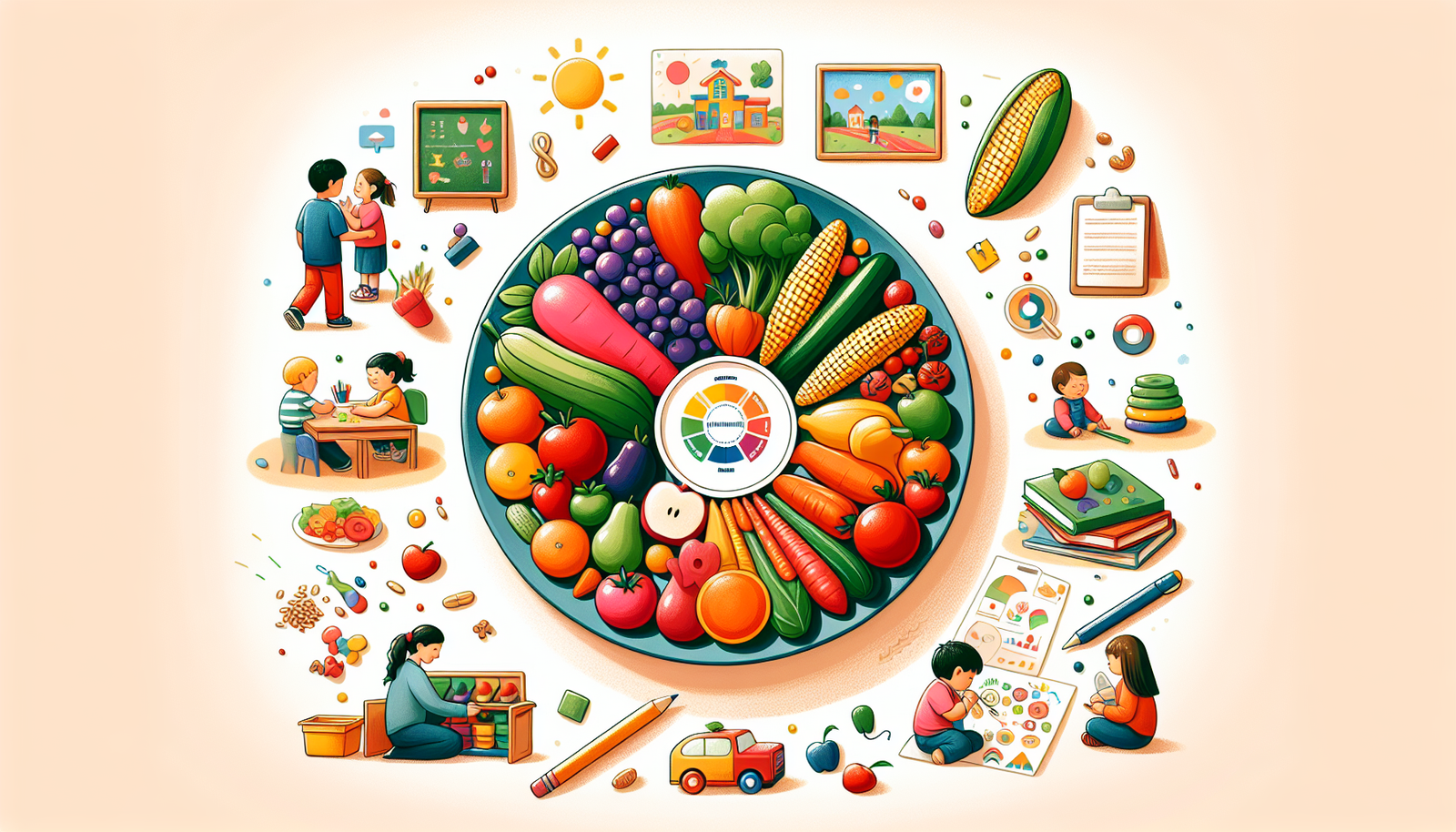Did you know that the seeds of good health can be planted as early as childhood? In this article, we explore the lifelong benefits of early nutritional education. From fostering healthy eating habits to promoting overall well-being, providing children with the knowledge and understanding of proper nutrition can set them on a path to a lifetime of vitality and happiness. Join us as we uncover the myriad ways in which early nutritional education can positively impact their physical, mental, and emotional development.

Improved Physical Health
Prevention of Chronic Diseases
Early nutritional education has profound effects on improving physical health. By teaching children about healthy eating habits from an early age, they are equipped with the knowledge and skills needed to prevent various chronic diseases later in life. The consumption of nutritious foods, such as fruits, vegetables, and whole grains, can lower the risk of conditions like heart disease, diabetes, and certain types of cancer.
Weight Management
Establishing healthy eating patterns during childhood significantly contributes to weight management throughout life. By teaching children to make healthy food choices, they are more likely to maintain a healthy weight as they grow older. This reduces the risk of obesity and associated health problems, such as high blood pressure and joint issues.
Healthy Growth and Development
Early nutritional education also plays a crucial role in the healthy growth and development of children. Proper nutrition during the early years provides essential nutrients for the development of strong bones, muscles, and organs. Adequate intake of vitamins, minerals, and other nutrients supports optimal growth, ensuring that children reach their full potential physically.
Enhanced Cognitive Development
Improved Brain Function
A well-balanced diet that is rich in essential nutrients positively impacts brain function. Nutritional education empowers children to make choices that support their cognitive development, leading to improved memory, focus, and overall brain function. Consuming foods such as fatty fish, nuts, and seeds, which are high in omega-3 fatty acids, can boost brain health and cognitive abilities.
Better Academic Performance
Nutrition and academic performance go hand in hand. By providing children with the knowledge and understanding of how different foods affect their bodies and minds, early nutritional education can enhance their academic performance. Research has shown that students who consume healthy meals, including whole grains and fruits, perform better academically with improved concentration, memory, and problem-solving skills.
Enhanced Cognitive Skills
Early nutritional education sets the foundation for the development of lifelong cognitive skills. A well-rounded diet enriched with vitamins and minerals supports cognitive abilities like critical thinking, creativity, and decision-making. Incorporating a variety of foods into their daily diet ensures that children receive the necessary nutrients to foster cognitive development.
Establishing Healthy Eating Patterns
Building a Strong Foundation
Early nutritional education lays the groundwork for establishing healthy eating patterns that can be sustained throughout life. Teaching children about the importance of consuming a variety of nutrient-dense foods, such as lean proteins, whole grains, and fresh fruits and vegetables, helps build a strong foundation for their overall health and well-being.
Long-term Healthy Eating Habits
By educating children about nutrition early on, it becomes easier for them to develop long-term healthy eating habits. They learn to prioritize nourishing foods over processed and sugary options, setting them on a path toward a lifetime of mindful eating. This not only benefits their physical health but also instills important values surrounding food and nutrition.
Balanced Nutrient Intake
Early nutritional education ensures that children understand the importance of a balanced nutrient intake. They learn about the essential macronutrients (carbohydrates, proteins, and fats) and micronutrients (vitamins and minerals) that their bodies need to function optimally. By incorporating a variety of foods into their diet, children receive a wide range of nutrients, promoting overall health and well-being.
Decreased Risk of Nutritional Disorders
Prevention of Malnutrition
Early nutritional education plays a vital role in preventing malnutrition. By teaching children about the importance of consuming a diverse range of foods, they develop a balanced and varied diet that meets all their nutritional needs. This reduces the risk of both undernutrition and overnutrition, ensuring optimal growth and development.
Lower Incidence of Food Allergies
Early nutritional education also helps reduce the incidence of food allergies. By introducing children to a wide variety of foods early on, their immune systems are exposed to different allergens, potentially reducing the risk of developing allergies. Moreover, understanding the signs and symptoms of food allergies enables children to make informed choices and seek appropriate medical help if necessary.
Reduced Risk of Eating Disorders
Proper nutritional education from an early age can also reduce the risk of eating disorders. Teaching children about the importance of a healthy body image, self-acceptance, and mindful eating can help prevent the development of unhealthy eating behaviors and attitudes towards food. By promoting a balanced approach to nutrition, children are more likely to develop a positive relationship with food and their bodies.

Positive Impact on Behavior and Attitudes
Promoting Positive Food Relationships
Early nutritional education contributes to promoting positive food relationships among children. By teaching them about the importance of enjoying a wide variety of foods in moderation, children develop an appreciation for the tastes and textures of different foods. They understand that food is not only a source of nourishment but also a source of enjoyment and social connection.
Behavioral Changes
Nutritional education from an early age can lead to positive behavioral changes. With a better understanding of the impact of nutrition on their bodies, children are more likely to make healthier food choices and adopt other health-promoting behaviors. This includes staying physically active, getting enough sleep, and engaging in positive stress management techniques.
Reduced Risk of Disordered Eating
Early nutritional education can help reduce the risk of disordered eating behaviors. By promoting a balanced approach to nutrition and fostering a positive body image, children are less likely to develop disordered eating patterns such as restrictive or binge-eating behaviors. Empowering children with the knowledge to nourish their bodies appropriately can help prevent the development of unhealthy relationships with food.
Improvement in Mental Health
Reduced Risk of Depression and Anxiety
Early nutritional education has been linked to a reduced risk of depression and anxiety. Research suggests that a diet rich in whole foods, including fruits, vegetables, lean proteins, and healthy fats, can positively impact mental health. By teaching children to prioritize these nutrient-dense foods, they may experience improved mental well-being and a lower risk of developing mental health disorders later in life.
Enhanced Emotional Well-being
Nutritional education also plays a significant role in enhancing emotional well-being. By educating children about the connection between food and emotions, they learn that a balanced diet can contribute to stability in mood and emotional regulation. Understanding the importance of nourishing their bodies with wholesome foods empowers children to take control of their emotional well-being.
Improved Mood and Happiness
Proper nutrition from an early age can contribute to improved mood and overall happiness. By consuming foods that are rich in essential nutrients, children’s bodies receive the necessary building blocks for neurotransmitters that regulate mood. A well-balanced diet can help stabilize mood swings and enhance feelings of happiness and contentment.
Better Long-term Health Outcomes
Reduced Risk of Lifestyle-related Diseases
Early nutritional education significantly reduces the risk of developing lifestyle-related diseases. By establishing healthy eating patterns from childhood, children are less likely to develop conditions such as obesity, type 2 diabetes, and cardiovascular diseases later in life. Teaching children about the importance of a balanced diet and regular physical activity empowers them to make choices that support their long-term health.
Increased Lifespan
Proper nutrition early in life can contribute to increased lifespan. By ensuring children receive adequate nutrients, their bodies are better equipped to resist infections and diseases, leading to a lower risk of mortality. Additionally, adopting healthy eating habits from childhood sets the foundation for a lifestyle that prioritizes long-term health and longevity.
Improved Quality of Life
Early nutritional education improves the overall quality of life for individuals. By instilling healthy eating habits and a comprehensive understanding of nutrition, children are equipped with the tools to take care of their bodies and minds. This empowers them to make choices that support their well-being, leading to improved physical health, mental well-being, and a greater overall quality of life.
Economic Benefits
Lower Healthcare Costs
Early nutritional education brings significant economic benefits, including lower healthcare costs. By preventing the development of chronic diseases and reducing the risk of lifestyle-related conditions, individuals require fewer medical interventions and treatments. This results in reduced healthcare expenses for both individuals and healthcare systems, ultimately leading to more sustainable healthcare costs.
Decreased Productivity Loss
Improved nutritional education from an early age also decreases productivity loss. Studies have shown that individuals with better overall health, achieved through good nutrition, have higher levels of productivity, both in school and in the workplace. By instilling healthy eating habits and promoting overall well-being, individuals are more likely to thrive and contribute actively to society.
Decreased Burden on Healthcare System
Proper early nutritional education also reduces the burden on healthcare systems. By encouraging healthy lifestyle choices, individuals become less dependent on healthcare services, preventing the overcrowding of hospitals and healthcare facilities. This enables healthcare systems to allocate resources more efficiently and effectively, benefiting the entire community.
Empowering Individuals
Increased Nutritional Awareness
Early nutritional education empowers individuals with increased nutritional awareness. By understanding the impact of food on their bodies and minds, individuals can make informed choices regarding their diet. They become knowledgeable about the importance of consuming a variety of nutrient-dense foods and the potential consequences of unhealthy eating habits, leading to greater control over their own health and well-being.
Ability to Make Informed Choices
Nutritional education equips individuals with the ability to make informed choices regarding their health. By teaching them how to decipher food labels, understand the nutritional content of various foods, and identify healthier options, individuals gain the skills needed to navigate the complex world of nutrition. This empowers them to make choices that align with their personal health goals.
Better Advocacy for Health Rights
Early nutritional education also enables individuals to advocate for their health rights. By understanding the importance of proper nutrition and its impact on overall well-being, individuals can actively engage in discussions and initiatives that promote access to healthy food options and nutritional education programs. This advocacy enhances community health and ensures that everyone has the opportunity to make informed choices about their nutrition.
Positive Impact on Family and Community
Healthy Food Choices for the Entire Family
Early nutritional education extends beyond the individual to benefit the entire family. By sharing knowledge and promoting healthy eating habits, children can influence their family members to make healthier food choices. This ripple effect creates a positive environment where everyone in the family is engaged in making informed choices that support their health and well-being.
Community-wide Health Awareness
Nutritional education has the power to promote community-wide health awareness. By implementing educational programs within schools, community centers, and other public spaces, individuals are exposed to important information about nutrition and its impact on overall health. This heightened awareness fosters a community culture that prioritizes health and well-being, benefiting everyone.
Reduced Healthcare Expenses for the Community
By improving the health of individuals through nutritional education, healthcare expenses for the community as a whole are reduced. When fewer people develop chronic diseases and lifestyle-related conditions, the burden on healthcare systems decreases, resulting in substantial cost savings. These savings can be redirected to other essential areas, further contributing to community well-being.
In conclusion, early nutritional education offers lifelong benefits in various aspects of an individual’s life. From improved physical health and cognitive development to positive behaviors and attitudes, the impact of early nutrition on an individual’s well-being is profound. Furthermore, the economic benefits, empowerment, and positive impact on families and communities further highlight the importance of prioritizing early nutritional education. By investing in the nutritional education of children, we pave the way for healthier, happier, and more prosperous lives for individuals and society as a whole.

